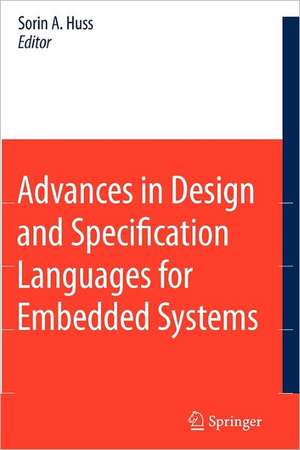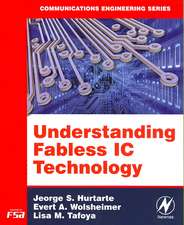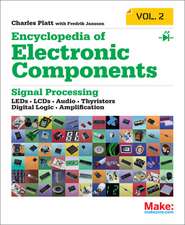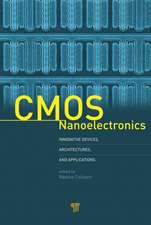Advances in Design and Specification Languages for Embedded Systems: Selected Contributions from FDL’06
Editat de Sorin Alexander Hussen Limba Engleză Paperback – 19 oct 2010
Advances in Design and Specification Languages for Embedded Systems is the latest contribution to the Chip Design Languages series and it consists of selected papers presented at the Forum on Specifications and Design Languages (FDL'06), in September 2006. FDL, an ECSI conference, is the premier European forum to present research results, exchange experiences, and learn about new trends in the application of specification and design languages as well as of associated design and modelling methods and tools for integrated circuits, embedded systems, and heterogeneous systems. Modelling and specification concepts push the development of new methodologies for design and verification to system level, they thus provide the means for a model-driven design of complex information processing systems in a variety of application domains.
| Toate formatele și edițiile | Preț | Express |
|---|---|---|
| Paperback (1) | 947.98 lei 6-8 săpt. | |
| SPRINGER NETHERLANDS – 19 oct 2010 | 947.98 lei 6-8 săpt. | |
| Hardback (1) | 954.14 lei 6-8 săpt. | |
| SPRINGER NETHERLANDS – 29 iun 2007 | 954.14 lei 6-8 săpt. |
Preț: 947.98 lei
Preț vechi: 1156.07 lei
-18% Nou
Puncte Express: 1422
Preț estimativ în valută:
181.45€ • 197.16$ • 152.52£
181.45€ • 197.16$ • 152.52£
Carte tipărită la comandă
Livrare economică 21 aprilie-05 mai
Preluare comenzi: 021 569.72.76
Specificații
ISBN-13: 9789048175499
ISBN-10: 9048175496
Pagini: 368
Ilustrații: X, 358 p.
Dimensiuni: 155 x 235 x 19 mm
Greutate: 0.52 kg
Ediția:Softcover reprint of hardcover 1st ed. 2007
Editura: SPRINGER NETHERLANDS
Colecția Springer
Locul publicării:Dordrecht, Netherlands
ISBN-10: 9048175496
Pagini: 368
Ilustrații: X, 358 p.
Dimensiuni: 155 x 235 x 19 mm
Greutate: 0.52 kg
Ediția:Softcover reprint of hardcover 1st ed. 2007
Editura: SPRINGER NETHERLANDS
Colecția Springer
Locul publicării:Dordrecht, Netherlands
Public țintă
ResearchCuprins
Analog, Mixed-Signal, and Heterogeneous System Design.- Compact Modeling of Emerging Technologies with VHDL-AMS.- Baseband Modeling Using Multidimensional Networks in VHDL-AMS.- Verification-Oriented Behavioral Modeling of NonLinear Analog Parts of Mixed-Signal Circuits.- Improving Efficiency and Robustness of Analog Behavioral Models.- ModelLib: A Web-Based Platform for Collecting Behavioural Models and Supporting the Design of AMS Systems.- C/C++-Based System Design.- The Quiny SystemCTM Front End: Self-Synthesising Designs.- Mining Metadata from SystemC IP Library.- Nonintrusive High-level SystemC Debugging.- Transaction-Level Modeling in Communication Engine Design: A Case Study.- Object-Oriented Transaction-Level Modelling.- Formalisms for Property-Driven Design.- An Efficient Synthesis Method for Property-Based Design in Formal Verification: On Consistency and Completeness of Property-Sets.- Online Monitoring of Properties Built on Regular Expressions Sequences.- Observer-BasedVerification Using Introspection: A System-level Verification Implementation.- Formalizing TLM with Communicating State Machines.- Different Kinds of System Descriptions as Synchronous Programs.- UML-Based System Specification and Design.- A Model-driven Co-design Flow for Embedded Systems.- A Method for Mobile Terminal Platform Architecture Development.- UML2 Profile for Modeling Controlled Data Parallel Applications.- MCF: A Metamodeling-based Visual Component Composition Framework.- Reusing Systems Design Experience Through Modelling Patterns.
Textul de pe ultima copertă
Embedded systems are meanwhile in the focus of industry in quite different application domains such as automotive, avionics, telecom, and consumer products. The need for a shift in design methodologies towards system level design is widely recognised and design flows aimed to an integration of software and hardware specification and implementation approaches are being developed.
Standardization efforts, such as SystemC Transaction Level Modelling and Model Driven Architecture of the OMG, provide the foundations of these new design flows. Design and specification languages are of utmost interest in the area of embedded systems and the Forum on Specification and design Languages has been once again been the main European event for the embedded systems and chip design community.
Advances in Design and Specification Languages for Embedded Systems is the latest contribution to the Chip Design Languages series and it consists of selected papers presented at the Forum on Specifications and Design Languages (FDL'06), which took place in September 2006 at Technische Universität Darmstadt, Germany. FDL, an ECSI conference, is the premier European forum to present research results, to exchange experiences, and to learn about new trends in the application of specification and design languages as well as of associated design and modelling methods and tools for integrated circuits, embedded systems, and heterogeneous systems. Modelling and specification concepts push the development of new methodologies for design and verification to system level, they thus provide the means for a model-driven design of complex information processing systems in a variety of application domains.
Standardization efforts, such as SystemC Transaction Level Modelling and Model Driven Architecture of the OMG, provide the foundations of these new design flows. Design and specification languages are of utmost interest in the area of embedded systems and the Forum on Specification and design Languages has been once again been the main European event for the embedded systems and chip design community.
Advances in Design and Specification Languages for Embedded Systems is the latest contribution to the Chip Design Languages series and it consists of selected papers presented at the Forum on Specifications and Design Languages (FDL'06), which took place in September 2006 at Technische Universität Darmstadt, Germany. FDL, an ECSI conference, is the premier European forum to present research results, to exchange experiences, and to learn about new trends in the application of specification and design languages as well as of associated design and modelling methods and tools for integrated circuits, embedded systems, and heterogeneous systems. Modelling and specification concepts push the development of new methodologies for design and verification to system level, they thus provide the means for a model-driven design of complex information processing systems in a variety of application domains.
Caracteristici
Represents the state of the art in research and practice Identifies new research directions Highlights the role of specification and modelling languages Presents practical experiences with specification and modelling languages
















